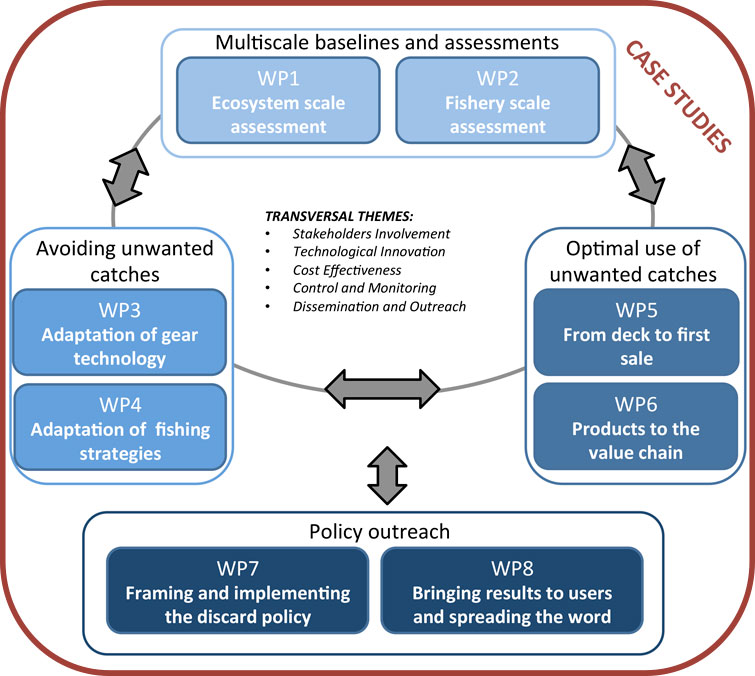DiscardLess is designed to take on the simultaneous challenges and opportunities of studying and implementing a radical new management approach. Placing DiscardLess in its policy context will bring it to the forefront of documenting the history of a fundamental paradigm shift in European fisheries management.
Significant progress beyond the state-of-the-art will be achieved in all WPs, while it is recognized that the science base on discarding will continue to expand rapidly.

WP1 will advance our understanding of the impact of the landing obligation on key fish stocks and marine ecosystems. We will review the existing knowledge on current discarding practices, available quantitative discard data, and their use in the current fish stock evaluation and management for all the case studies fisheries.
Lead: IFREMER, France
WP2 will play a central role in filling knowledge gaps and monitoring actual changes in economic profitability and in stakeholders’ attitudes and perceptions. Since incentives to discard usually do not coincide with society’s management goals, analyses are needed both on the socio-economic as well on the business economic level.
Lead: IFRO-University of Copenhagen, Denmark
WP3 will review the best programmes to assess the most successful and to identify best practices. Providing fishers with an economic model in to which they can enter their own specific details/data will permit them to assess both the selective and economic impact of using more selective gears.
Lead: Marine Scotland Science, UK
WP4 will formalise fishers’ knowledge into the understanding and modelling of where and when to fish, and make best use of most recent tools and models for the fine-scale mapping of individual behaviour to fully understanding the changes created by the landing obligation.
Lead: Marine Institute, Ireland
WP5 will identify the most relevant options for on-board handling and storing, taking into account different vessel types and sizes, gears, species, geographical areas. Solutions for on-board handling including sorting, bleeding, cleaning, chilling, pre-processing, storing will be suggested, including where applicable the transfer of useful technology and knowledge between sectors, facilitated by the involvement of fishers and technology providers.
Lead: Matís ltd. - Icelandic Food and Biotech, Iceland
WP6 will investigate the logistics and processing requirements for unloading, classification, pre-treatment and storage at port. An important innovative tool in DiscardLess will be the development of an automatic system for the quantification and classification of catches landed in bulk, including bycatch.
Lead: AZTI-Tecnalia, Spain
WP7 will provide and integrate knowledge relevant for successful discard governance in Europe. Documentary and interview based research on the background and objectives of the landing obligation will establish an improved basis for progressing towards these objectives.
Lead: University of Tromsø, Norway
WP8 aims to be an effective vector of knowledge transfer, allowing maximal diffusion of scientific results into concrete information that can be bought in by the fishing and seafood industries. The DMS toolbox and our other media products including an educational film will provide a concrete and lively platform for gathering and visualising the knowledge to be exchanged.
Lead: Alphafilm & Communication, Denmark